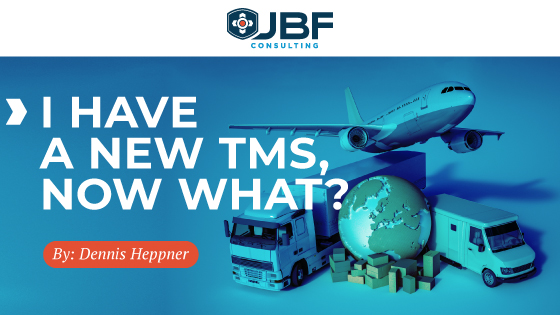
Do a search on “How to successfully implement new Transportation Management Technology” and you will get plenty of results laying out the steps in a logical way, usually pretty intuitive stuff either from a technical perspective or from an organization readiness perspective.
However, more often than not, the final step will be something like “Rollout” or “Reap the Benefits!”.
But if you are the business sponsor, and ultimately the keeper of new technology, you may ask yourself “How do I ensure I get the ROI I promised leadership?” or “How do I take ownership of this shiny new toy and really power up my team?”
This can be especially daunting if the implementation was driven by your internal IT team or the technology vendor. Hopefully you had input in defining requirements and processes, but do you really know what will happen when IT hands you the keys and you get to drive?
You know that the TMS will significantly augment your team’s ability to respond to changes within your supply chain, secure additional capacity, provide visibility, reduce manual operations and overcome everyday challenges. And there doubtless will be a transition period learning all the features of the new vehicle.
At some point, though you will ask yourself “Now What? I sure wish someone would make sure I am getting the full benefits of my new ride.” Engaging a business partner that ideally provided guidance and support through the implementation should be at the ready to bring additional value-add in some of the following ways (not an all-inclusive list):
Supply Chain Design (network modeling)
- Optimizing the number, location and capacities of DCs
- Optimizing the number, location and capacities of plants and production lines
- Determining the cost and service impact of changes on the network, e.g., new DCs, closed plants and new ports-of-entry
- Determining the impact of changes in demand, operating cost and commodity pricing on the network, e.g., risk assessment
Transportation Modeling and Optimization
- Route optimization
- Business rules analysis, e.g., time windows and service times
- Shipment consolidation and continuous moves identification
- Mode (private fleet/TL/LTL) optimization
- Private and dedicated fleet sizing
Data and Analytics in the New Environment
- Provide benchmarking analytics by sampling shipment transactions and aggregating metrics across shippers to show how KPIs compare to other shippers in same industry or across other industries
- Integrity of TMS master data (e.g., customer sites, carriers and products)
- Customer shipment frequency
- Truckload utilization
- Parcel zone skipping
- Mode mix changes
- Deadheads/backhauls
- On-time pick-ups and deliveries
- Routing guide confirmation
- Fuel surcharge/accessorial analysis
Stewardship
- You, the business leader, should be the owner of your technology. Your advisor should make sure you understand the capabilities you have with the tools you have in place, and how to make changes to ensure your system keeps up with the pace of business change. This is done through education and changing the business paradigms of “that’s an IT problem” to ensure continuous improvement is fully in play.
Summary
A trusted advisor will remain engaged with you and deliver ‘leveraged’ value by using more of your software functionality and capability to provide high value-added analytics like modeling, network design, operations analytics, and post-implementation continuous improvement. Then you will really reap the benefits and exceed expectations of the C-Suite.
Dennis Heppner is a Principal at JBF Consulting. Dennis’ expertise in transportation, logistics and supply chain operations, and third-party providers spans 25+ years. His experience is broad-based, spanning entire supply chains, including business process redesign, sourcing, distribution network design, transportation management, distribution operations, outsourcing selection, and business strategy for major manufacturers, distributors, retailers including eCommerce, and service organizations.
About JBF Consulting
Founded in 2003, JBF Consulting is a supply chain execution strategy and systems integrator to logistics-intensive companies of every size and any industry. Our background and deep experience in the field of commercial logistics technology implementation positions us as industry leaders whose craftsmanship exceeds our client expectations. We expedite the transformation of supply chains through logistics & technology strategy, commercial & bespoke software implementation, and analytics & optimization.

